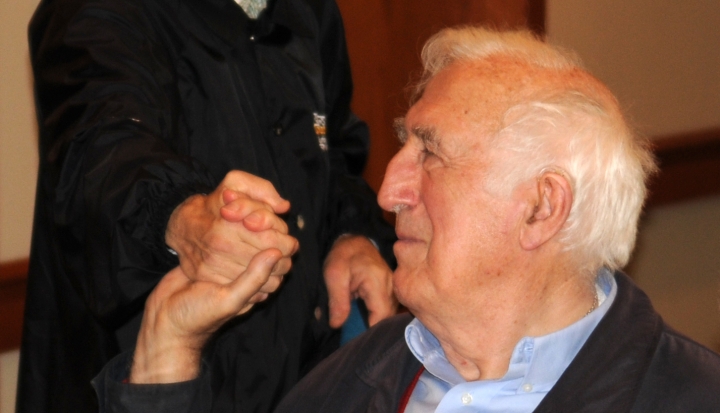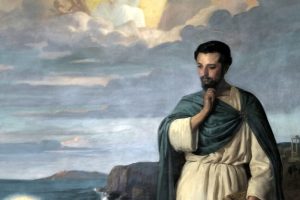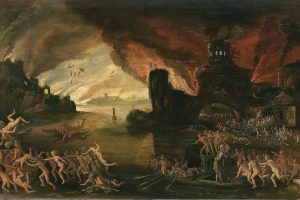Jean Vanier offers a simple summary of the purpose of the small community he began in 1964: “The secret of L’Arche is relationship: meeting people heart to heart; listening to people with their pain, their joy, their hope, their history.”
Harder to describe are the profound effects of life together on L’Arche’s members, both the developmentally disabled “core members” and the “assistants” who care for their needs.
From a single house in France, L’Arche (French for “The Ark”) has grown to more than 130 communities throughout the world, including 15 in the United States. From its original Roman Catholic foundation, L’Arche has expanded to include Protestant and Orthodox Christians and is beginning to reach beyond Christianity. When groups ask for the “formula” that would allow them to reproduce L’Arche, Vanier offers a simple answer. “It’s really around friendship and taking chances and believing in very simple things.”
Jean Vanier was born in Canada in 1928. After serving in the British and Canadian navies, he earned a doctorate in philosophy from the Institut Catholique in Paris. He lives in Trosly Breuil, France, where he founded L’Arche with Father Thomas Philippe in 1964.
How did you first get involved with people with disabilities?
Really the story goes back to World War II and my joining the British Navy at age 13. After eight years I decided to leave the Navy not knowing what I was going to do except that I wanted to follow Jesus.
I moved to a community next to the Dominican House of Studies in France in 1950, where I pursued a doctorate in philosophy, which I later taught for some time. It was there that I met Father Thomas Philippe. I knew in some way that he was a presence of God for me.
In 1963 Father Thomas was chaplain of a small institution of people with disabilities in the village of Trosly Breuil, and he suggested I come there because, in order to understand human beings and society, he said, you have to understand and be in contact with those who are the most rejected. I was a little bit nervous, but I went. The institution housed about 30 people with disabilities, men from the age of 16 to 40.
How did you react?
I was shocked and amazed. It was a small institution, but quite intense. Every one of the residents was hungry to enter into a relationship with me. My philosophy students had wanted my head, but these people wanted my heart. It was a cry for relationship.
It was also a discovery of two worlds: the world of comfortable people, who were able to make choices, and uncomfortable people, who had no choices. So I started visiting the psychiatric hospitals in that part of France, listening to people.
But I really wanted to be close to Father Thomas, so I decided to stay in Trosly Breuil but also to live with two or three people with disabilities. I got a dilapidated old house with no electricity.
How did you choose the people that you first began living with?
I didn’t really choose. I got close to the director of an institution for people with disabilities, and she said I could have three of her residents. Looking back, it was a difficult place; the institution housed 80 people and was overflowing.
One, Raphael, had had meningitis. He couldn’t speak very much. Another, Philippe, had had encephalitis, one leg paralyzed, one arm paralyzed. He spoke too much. There was a third one, Danny, whom I should never have accepted and actually only stayed a day because he was unable to hear or see, and he had a deep psychosis. As soon as he left the institution, he became quite upset. And so the first night, I had Raphael and Philippe and this guy who was completely terrified. So I had to call the institution and say, “Come back quickly.” That’s how it began.
What did you learn from the relationship with Raphael and Philippe, and how did that set you on your path?
First of all, I was happy, and Raphael and Philippe were happy to be out of the institution. They brought out the child within me. I’d been serious, a teacher, and prayerful. But they brought out my desire to goof around. Because with people with disabilities, you don’t talk philosophy, you play.
The goal was creating a relationship. But they had to get to know me, and I had to get to know them. It was a gradual discovery of this incredibly beautiful capacity to relate. Raphael and Philippe had never been appreciated or seen as valuable. For me, it was the whole discovery of the broken heart, the wounded heart.
Did L’Arche grow quickly?
All sorts of things started happening. First a psychiatrist asked if we could take in somebody who had no place to go. Soon there was another house in the village that we could buy. In August of 1964 we had moved up to four or five people. Then, in March of 1965, the whole staff of the institution where Father Thomas was chaplain left—it then had 32 people—and I was asked to take it over.
People started coming to help, but it was never enough. So those years were difficult.
What was the key in creating relationships with people with disabilities?
It took time for me to realize that what was important was really listening to their needs and hopes. It was a gradual shift for me to listen and to create a community structure where we listen to each other.
Fortunately I’m somebody who can go with the flow. Assistants who had more experience than I had in working with people with disabilities would say, “You shouldn’t do this and you shouldn’t do that.” I discovered I could do nothing by myself. We could only do something together.
So the keys to breaking down barriers were listening, evaluating, discerning. It was a gradual formation in myself and a transformation. I had to move from generosity to communion.
What’s wrong with generosity?
Well, with generosity you always have power. You have money and opportunity. I always had power through teaching. But communion is about losing power and becoming a friend to someone. I was trying to move from generosity to personal encounter. And that implies listening and understanding.
But that move requires me to be vulnerable. To move from personal encounter to a friendship and then to a commitment—little by little there is a loss of power. I discovered that it’s vital that people be welcomed and discover a place of belonging. We belong to each other. But this realization came gradually.
I think my strength was that I didn’t quite know what I was doing. When you don’t know what you’re doing you sort of follow the music. You go with the flow. People come. Some stay. Some go on. People are being transformed.
Yet through all that, a plan evolved. I believe it’s a miracle. I never wanted to start a movement. I just wanted to be close to Father Thomas and to live with two or three people. Today we have 131 L’Arche communities and about 10 on the drawing board.
What do you think drives that growth? Why is L’Arche so attractive?
I think there is a gradual realization that it’s the people with disabilities who are changing the rest of us. I had dinner last night at our community in Chicago, and there was a presence of God in that gathering, a gentleness, a peacefulness, a kindness. This is a little place in the kingdom of God. There’s joy. There’s happiness. There’s prayerfulness.
St. Paul in his First Letter to the Corinthians says that those parts of the body that are the weakest and the least presentable are necessary to the body and should be honored. I never read an ecclesiology that says we need people with disabilities to be the church. But the church cannot be church if parts of the body are separate. And all the parts of the body are necessary; the body cannot exist without those parts. So there’s a whole new understanding of church connected to our communities.
At the same time, we are not fighting a cause, though there is a sense that, through L’Arche, something has been given to us that is for the whole church. And when I say the whole church, rather than just the Catholic Church, it’s because Protestant and Orthodox Christians are involved as well. It may be for the whole world as well, as I see a new start welcoming Muslims.
We have learned how we are transformed by weakness. But we are in a culture that believes we are transformed by power. And the tension between weakness and power is in us all.
What prevents the church from placing people with disabilities at its center?
It’s always difficult to pinpoint things. When a PBS crew came to L’Arche to do a report, they said, “We’ve never seen anything like this before.” You can go into a church and not have that experience of joy and belonging.
Jesus was credible because he did things. What is being done today that makes the Catholic Church or Christians credible?
The whole question is transformation. Somehow L’Arche has moved from a place of justice for people with disabilities to being a place of the kingdom where people are transformed because of people with disabilities.
In one of our homes we have very severely disabled people. Most people think there’s no relationship possible with people in that condition. And then young assistants come and they are transformed precisely because of this relationship. But they begin sensing the conflict with culture.
What is the conflict?
The culture of the United States is a culture of success and of power and of upward mobility. You can see this even in the church in that it’s seen as a “promotion” to be named a cardinal. I see it as a demotion! I mean, who would ever want to be a cardinal?
What is important is to find places where you can rejoice and sing and be happy, be as human as possible.
But even the notion of community has been broken now. There are very few places in the world today where people are working with each other, struggling together, and loving each other. I saw it in Washington, D.C. in an African American church where I sensed that people loved one another. I’ve seen it in evangelical communities in France, where people would say, “I just visited this guy in our community who was in prison.” You sensed people loved one another.
The Catholic Church has insisted on the sacramental reality, but sometimes we’ve missed the relationship between communion with Jesus and communion in a group. In our culture we’re frightened of being in relationships. We’re too fearful. Yet Jesus is telling us that we are strengthened by the love we have for one another. We can’t be frightened of meeting people who are different.
Instead we create walls. In the United States, in all countries, the whole focus is on security. And the stranger is a potential danger. Immigrants are a potential danger. Nobody knows quite what to do.
Can you talk more about the Catholic roots of L’Arche and how it has grown beyond Roman Catholicism?
We were certainly born on Catholic soil. What I call the elements of the Catholic Church—the Word, the Eucharist, the priest-are fundamental to L’Arche. There is also a vision in Catholicism, an anthropology of the gospels, of how the weak transform the strong.
But L’Arche quickly grew to include Anglicans as well. Now we say every community should try to define its religious affiliation. Our local community is a Catholic community. When we are in Calcutta, community members are Hindus, and now we have grown so that we may even found communities with Muslims and Muslim people with disabilities. How will that be? We don’t know. But people come to our community not because they are Catholic but because they are in pain. The passport in the community is suffering.
But we’ll try to discern and to understand, and that’s why we need help from theologians and anthropologists. I think we need help because we can’t do it on our own. But it’s always about how the weak are transforming us.
It’s said Pope John Paul II was a fan of L’Arche.
The first time I saw John Paul, in 1985, he was in good health and he asked me to speak about L’Arche. I told him about Eric, who was blind and deaf, and how Eric had changed my life. Afterwards I heard that he told someone he hadn’t understood what I was trying to get at.
But he really did understand at the end of his life, because he was a visible sign of the presence of God through his weakness. In the last images that were taken of him at the east window of St. Peter’s, just shortly before he died, he is there with his mouth open, trying to get words out, really embodying the reality of Jesus on the cross. I think his weakness was giving a message to the world.
I was asked to comment on the rosary when John Paul came to Lourdes two years ago. I was just ahead of his “pope-mobile,” walking ahead to each of the five stations. One of the mysteries was about announcing Jesus to the poor. And I was looking at the pope, and I said, “Our pope is now among the poorest. But because he’s the poorest, he’s a sign of the glory of God, and God is working through his body.”
What kind of God is revealed in such weakness?
Ettie Hillesum, a Dutch Jewish woman who died in Auschwitz, was one of the great prophets of the sense of God’s presence. She said it isn’t we who need God; it’s God who needs us.
It’s a whole new vision of who God is, a vision of the littleness of God, the weakness of God. God is the most excluded one. Nobody wants God. Oh, yes, we’ll always talk about the God of power who is on our side. But a vulnerable God, a fragile God, a God who weeps?
I get irritated when people tell me we’re doing good work. I don’t want to do good work. It doesn’t interest me. What interests me are places in the kingdom that can reveal who God is.
How have these many years of living with people with disabilities affected you personally?
I remember one guy with very severe disabilities who had lived with his mother for 30 years. She got sick and he couldn’t live with her anymore, so he was put in a hospital. In the hospital he screamed and screamed and screamed.
His scream awoke my scream. His anguish awoke my anguish. When I would give him a bath, he was so open and completely relaxed. But once out of the bath, the tension in his body would return, and he would scream and scream. We decided not to give him medication to stop his screaming because it was a natural reaction to pain. And if you break the natural reaction to pain, he’ll have other reactions that will be more dangerous. So it was important that he scream. But that scream put me face to face with the reality of my own anguish and my own fear.
We just had a meeting in France for fathers of people with disabilities, and we could never have believed what happened. Fathers began speaking for the first time about their anger about having a child with disabilities. Up until then, it had been Mom’s problem. Fathers sink themselves into work, come home late, and never really accept the reality. But they suddenly started opening up because we gave them the opportunity to speak about their own pain.
People with disabilities reveal to us our own disabilities if we enter into this vulnerable relationship with them. I have experienced my own barriers, my own fears. But I also know that I’m on the road to healing. Maybe healing is knowing where your own pain is.
This article appeared in the August 2006 issue of U.S. Catholic (Vol. 71, No. 8, pages 18-23).
Image: Wikimedia Commons













Add comment